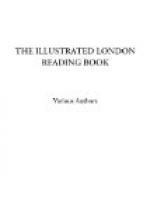more.
Elizabeth: ’The Lords told
me that releasement was committed to you, and you
give me neither releasement nor relief. My husband
is unlawfully in prison, and you are bound to discharge
him.’
Twisden: ‘He has been
lawfully convicted.’
Elizabeth: ’It
is false, for when they said “Do you confess
the indictment?” he answered, “At the
meetings where he preached, they had God’s presence
among them."’
Twisden: ’Will
your husband leave preaching? if he will do so, then
send for him.’
Elizabeth: ’My
Lord, he dares not leave off preaching as long as
he can speak. But, good my Lords, consider that
we have four small children, one of them blind, and
that they have nothing to live upon while their father
is in prison, but the charity of Christian people.’
Sir Matthew Hale: ‘Alas! poor woman.’
Twisden: ’Poverty is your cloak,
for I hear your husband is better maintained by running
up and down a-preaching than by following his calling?’
Sir Matthew Hale: ‘What is his calling?’
Elizabeth: ’A tinker, please you
my Lord; and because he is a tinker, and a poor man,
therefore he is despised and cannot have justice.’
Sir Matthew Hale: ’I am truly sorry
we can do you no good. Sitting here we can only
act as the law gives us warrant; and we have no power
to reverse the sentence, although it may be erroneous.
What your husband said was taken for a confession,
and he stands convicted. There is, therefore,
no course for you but to apply to the King for a pardon,
or to sue out a writ of error; and, the indictment,
or subsequent proceedings, being shown to be contrary
to law, the sentence shall be reversed, and your husband
shall be set at liberty. I am truly sorry for
your pitiable case. I wish I could serve you,
but I fear I can do you no good.’”
Little do we know what is for our permanent good.
Had Bunyan then been discharged and allowed to enjoy
liberty, he no doubt would have returned to his trade,
filling up his intervals of leisure with field-preaching;
his name would not have survived his own generation,
and he could have done little for the religious improvement
of mankind. The prison doors were shut upon him
for twelve years. Being cut off from the external
world, he communed with his own soul; and, inspired
by Him who touched Isaiah’s hallowed lips with
fire, he composed the noblest of allegories, the merit
of which was first discovered by the lowly, but which
is now lauded by the most refined critics, and which
has done more to awaken piety, and to enforce the
precepts of Christian morality, than all the sermons
that have been published by all the prelates of the
Anglican Church.
LORD CAMPBELL’S Lives of the Judges.
* * * *
*
THE LONG-EARED AFRICAN FOX.




